INTERVIEW: FIRE & DUST MEETS ROY MCFARLANE
THE HEALING NEXT TIME BY ROY MCFARLANE
Nine Arches Press
ISBN 978-1911027454
£9.99/79 pages
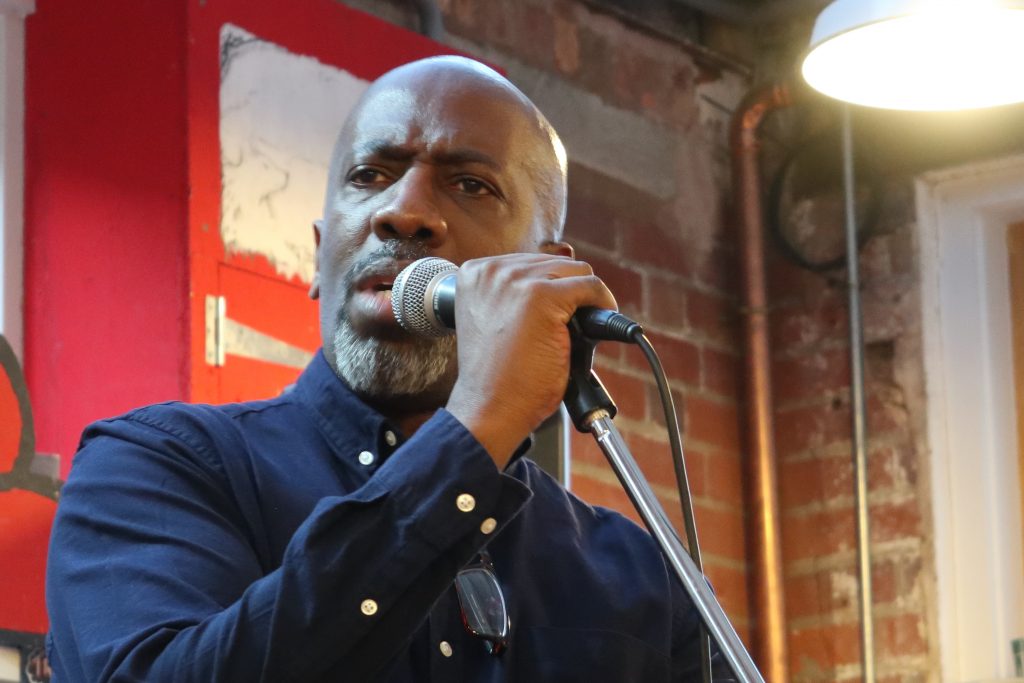
Photography credit: Alan Van Wijgerden
“[…]
Waiting for a meeting, Jim’s memories are stirred by the news of a bomb
outside the BBC. His large frame shudders; there’s always a warning, 6 minutes,
21 people died, the bomb under the Rotunda and the bus he should have been on
all pock-marked and deformed. The next day with Irish bastard ringing in his ear
he left work with a warning to take the weekend off.
*
Another session finished for the activist tackling racism in Bedfordshire,
making his way back to his family, resting at a service station, eyes drawn
to a television. A plane crashed into a tower – reality and disbelief collide – people
looking to each other for answers. Oh my god, another plane hit, did you see it.
He leaves and drives under a falling fog of fear.
There’s an aftermath of blame and scapegoats,
debris falling on the streets, falling everywhere.
[…]”
– from ‘2001 – When the Devil Comes Calling…’
Poet Roy McFarlane was born in Birmingham of Jamaican parentage, and has spent most of his years living in Wolverhampton and the surrounding Black Country. A graduate of the MA in Writing Poetry with The Poetry School and Newcastle University, he is presently the Birmingham & Midland Institute’s Poet in Residence and has held the role of Birmingham’s Poet Laureate. Roy’s writing has appeared in magazines and anthologies, including Out of Bounds (Bloodaxe, 2012) and Filigree (Peepal Tree, 2018), and he is the editor of Celebrate Wha? Ten Black British Poets from the Midlands (Smokestack, 2011). WoLF (Wolverhampton Literature Festival) Poetry Competition chose Roy to be their judge for 2019.
Both his first and second full collections of poems – Beginning with Your Last Breath (2016) and The Healing Next Time (2018)– are published with Nine Arches Press. Last year, The Healing Next Time was a Poetry Book Society Recommendation and also nominated for the Ted Hughes Award for New Work in Poetry.
We first met Roy at the Big Comfy Lit Fest in 2016, where the audience loved him and his performance, so we were delighted to welcome him back for Fire & Dust in May. After the gig, we caught up with our special guest to ask a few questions…
When did you first know you were a poet?
Knowing you’re a poet is the moment when you draw that one poem out of the stone or stand on a stage and you become one with the audience, it’s the moment when you declare with confidence and with humility: I’m a poet and I write poetry.
Who is your work aimed at – do you have an ideal audience in mind when you’re putting a poem together?
There is no ideal audience in the world of poetry, because we perform in diverse arenas, settings and themed events. If I can engage your body, mind and soul, then you’re my audience on the page and on the stage.
In addition to the more overt topics of racial prejudice, deaths in police custody, Black History and changes (or the lack thereof) over time – what would you say are some key themes in your new collection?
I think Ian Duhig called it a book of great love too; I think the book places a mirror before us and ask us to look at this continuing cycle of hate, the importance of being resolute and as a collective community to name discrimination and stand against it. But, ultimately, if we intend to break the wheel, only love has the ability to take us safely into the future.
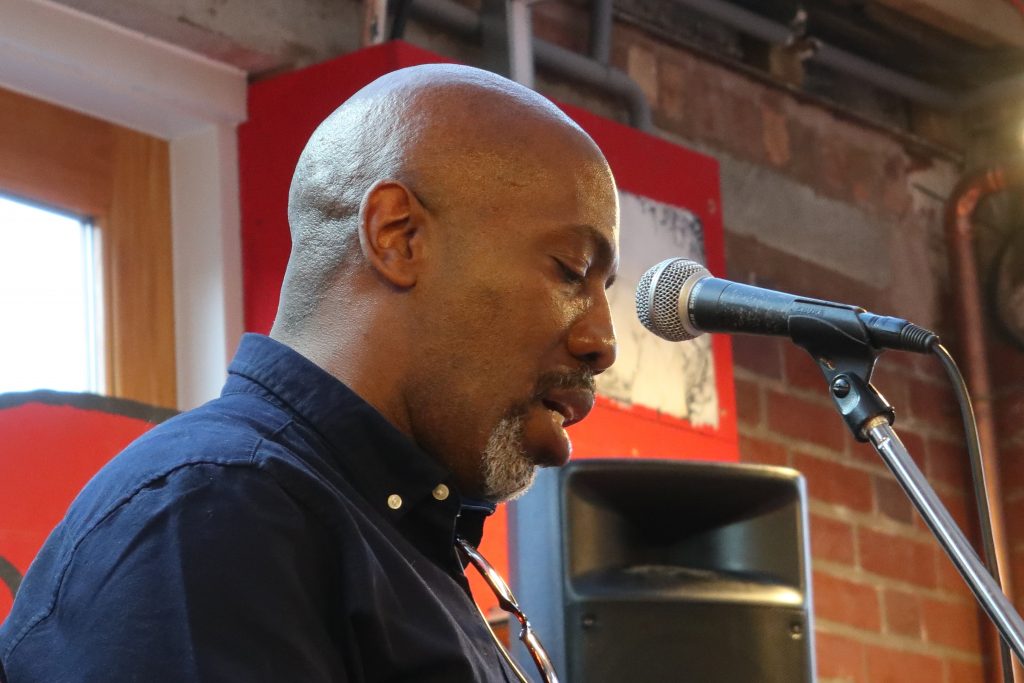
Photography credit: Alan Van Wijgerden
Was creating your second book a different experience from putting together Beginning with Your Last Breath?
Both books were personal, taking me back to moments of heartache, tragedy, highs and lows but the second book challenged me to explore some of the most tragic moments in the history of race and diversity in this country. Researching the deaths in custody was the most difficult and harrowing part of putting this book together; at times it left me distressed, in tears, angry and grieved.
When looking at the division of the book, the first part aimed to draw the reader in, to be active and have an insight to racism in all its varied forms. To understand challenging racism takes its toll both collectively and personally. The second required the reader to become a witness to Deaths in Custody, drawing you close and personal, at times making you the victim. And the third part along with Rasta aimed to guide the reader by the hand through time to the ultimate place of healing.
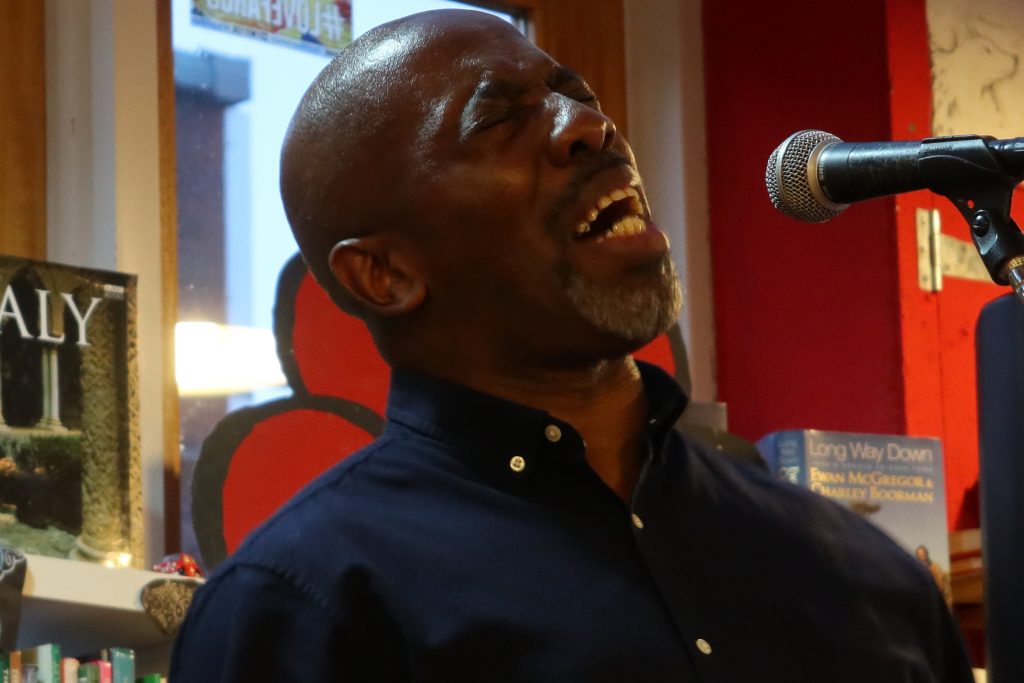
Photography credit: Alan Van Wijgerden
What messages(s) do you hope readers take away from The Healing Next Time?
To speak of the hurt and hate, and guide people to a place of healing.
The Healing Next Time is your second collection with Nine Arches Press. What, in your opinion, are the most important things poets should look for in a publisher/editor?
The writer/ publisher relationship is an important and vital relationship. Jane Commane has given me a space to be passionate and true, and, like a conductor, aims to make each part of the masterpiece musically ring off the page.
Our readers are likely to be curious about your poetry career and some of the exciting challenges you’ve taken on. What sort of projects does your stint as Poet-in-Residence (Birmingham & Midland Institute) involve? How does it compare to when you were Birmingham Poet Laureate – are they very different roles?
I’d like to think residencies have become my forte, from first poet-in-residence with Starbucks, and most famously my Poet Laureate role, to my present role with the B&MI. There’s not much difference in most residencies, the key aspects with the B&MI is to promote poetry and turn the building into a vibrant place for poetry. Presently I’m involved with an exciting project, where several local poets have been commissioned to respond to the B&MI and Birmingham; I’ll be supporting and programming the final piece.
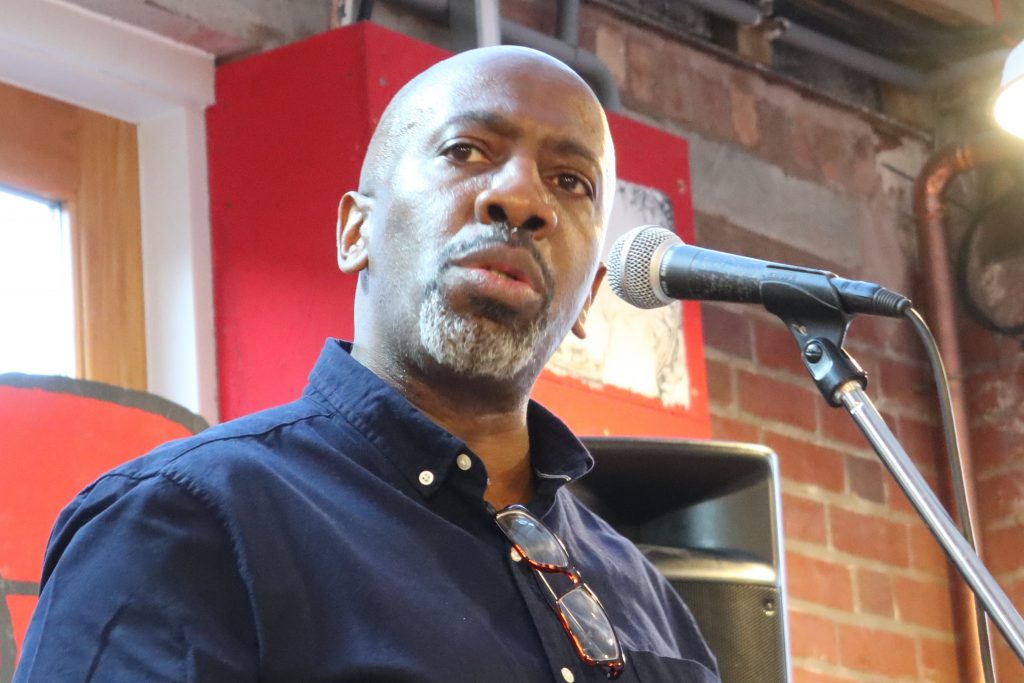
Photography credit: Alan Van Wijgerden
Is it hard work being a professional poet? Do you have any tips for people on how to turn their craft into a livelihood?
If you’re looking to get rich quick then forget it, but that doesn’t mean there are not poets doing well; the fact of the matter, there has never been a better time for being a poet. Advertisements like Nationwide are paying poets well. Theatres are looking for poets to think out of the box and create poetic pieces like Inua Ellams’ play The Half God of Rainfall. I believe according to The Guardian there have been record sales in poetry books over the last year. Organisations like Writing West Midlands are forever supporting and guiding poets. Beatfreeks and other organisations go from strength to strength in developing young poets to be creative and be proactive from a collective perspective. And there are great nights of poetry to be found around the West Midlands, like Fire & Dust in Coventry.
In interviews elsewhere, you’ve spoken about how you were first introduced to poetry through doing community work with young people, making use of music and rap. Big question but…what, to you, are the key differences between rap bars and spoken word poetry? Or do you consider them to be the same thing?
I think I heard Kate Tempest succinctly explain things when she was promoting her new album The Book of Traps and Lessons. Before this album she spent most of her time performing to the beat, the timing of words to sit on the beat, whereas with her latest album, the music becomes the landscape for the words to run and to flow at whatever beat and measure it desires. I believe spoken word has always at that freedom, without constrain to time or beat; it has its own internal clock, and if we listen carefully we are free.
Do you read/experience a lot of poetry? Which poets/ collections have recently made an impression on you?
It’s the staple diet of any poet, to read and read again. I’ve had the pleasure of reading a pre-publication of Antony Owen The Unknown Civillian; in a time of hostilities, tensions escalating between countries and a President who changes his mind at the last minute to launch missiles, we need to read this timely book reminding us of the futility and horrors of wars. Vanessa Kisuule’s Recipe for Sorcery is magical and usurping from a brilliant spoken word artiste. A wonderful anthology called Filligree: Contemporary Black British Poetry. I’ll be reading with Richard Scott at the Swindon Poetry Festival – his book Soho is brilliant. Precarious by Peter Raynard should be read by everybody. Layli Long Soldier, Wheras, is a lyrical response to the so-called apology by Congress to the native people of America. Tracey K. Smith’s Wade in the Water will blow your mind, especially her found poems of black soldiers and families of the civil war of America.
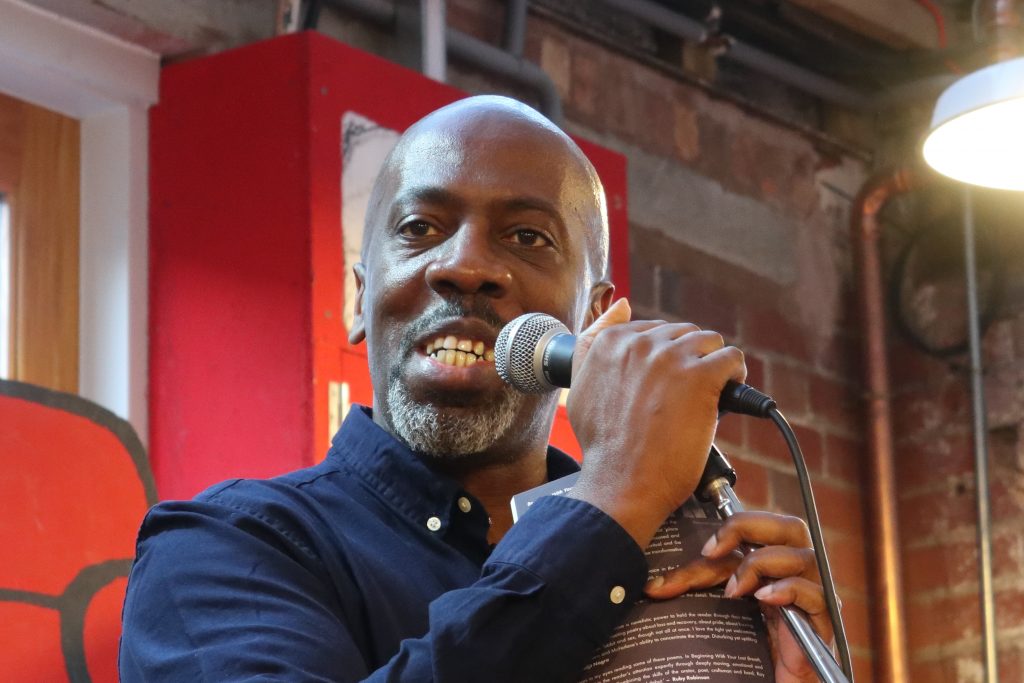
What gigs/projects have you got coming up next?
LEDBURY POETRY FESTIVAL SATURDAY 6TH JULY 3PM – 4PM
Reprieve readings and event hosted by Clive Stafford Smith with Roy McFarlane, Jane Commane, Jacqueline Saphra, Casey Bailey, Ruth Stacey, Vidyan Ravinthiran and David Morley
Ledbury, Community Hall | £9.50 (weekend pass £18)
LEAMINGTON POETRY FESTIVAL: POETRY OF PEACE & RECONCILIATION ON SATURDAY JULY 6TH, WHICH STARTS AT 5PM.
Roy Mcfarlane, Julie Boden and Antony Owen
All Saints Church, Leamington Spa, CV31 1AA
Plug some links/social media here:
Roy’s website
The Poetry Exchange
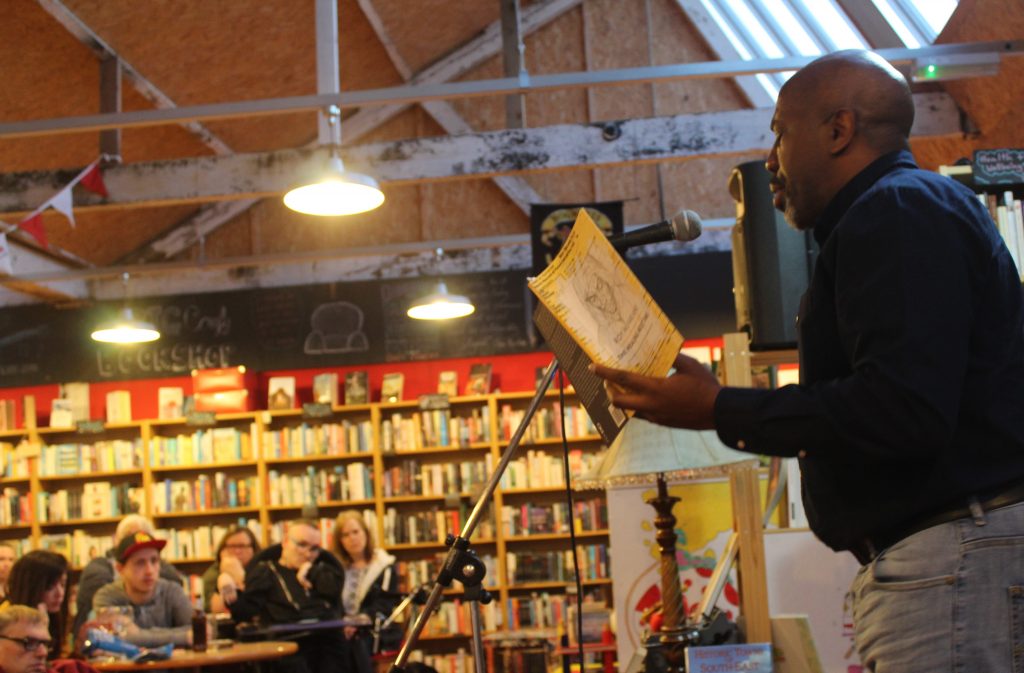
Roy’s excellent books are available direct from publisher Nine Arches Press, or you can purchase them from various online stores, including Waterstones and Hive Books.
Please note: there are only a few copies left of debut collection Beginning with Your Last Breath at Hive Books!
